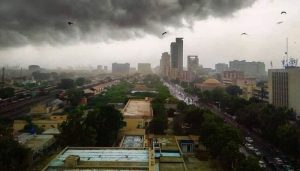
[ad_1]
ISLAMABAD: Pakistan, a nation grappling with severe economic turmoil, is facing an unprecedented brain drain. Asad Ejaz Butt, a brilliant economist, exemplifies this exodus.
After completing his graduate studies in Canada, Butt returned to Pakistan with a passion to contribute to his homeland’s development. However, despite securing prestigious jobs under two finance ministers, he struggled to make ends meet due to soaring inflation.
Butt’s story is not unique. Pakistan’s inflation rate has surpassed that of any other Asian nation, rendering necessities unaffordable for many.
The cost of living has become so prohibitive that even essential items like milk in Karachi exceed prices in Paris. Faced with economic precariousness, accomplished citizens across industries are fleeing the country, depriving banks, hospitals, and multinationals of vital talent and resources.
According to recent United Nations data, Pakistan recorded the highest outflow of skilled workers in several years, with over 1 million departing over the past three years alone.
This makes Pakistan one of the top 10 countries for emigration. The exodus is most pronounced among the wealthy and educated, with nearly 40% of Pakistanis expressing a desire to leave.
Business leaders lament that confidence in the country and its politicians has never been lower. Veqar Islam, CEO of JBS in Karachi, notes that desperation is at an all-time high, surpassing levels seen in the last 40 years.
Companies are struggling to retain talent, particularly in key sectors like tech and finance. To stay competitive, firms like TPL Corp. offer travel perks and pay top talent in US dollars.
Pakistan’s financial sector has been severely impacted, with top brokerage houses losing employees to foreign opportunities. Despite the country’s stock market being the world’s top performer, few bankers and traders want to stay. Mohammed Hunain, a certified financial analyst, relocated to Saudi Arabia despite being among Pakistan’s top 5% of earners.
The government recognizes the gravity of the situation, acknowledging that no great nation can thrive by exporting its top talent. To address this, officials have implemented measures like increasing taxes on high earners to meet IMF program requirements.
However, it remains uncertain whether this strategy will stem the brain drain.
For now, Pakistan’s economic downturn continues to drive away its brightest minds. Asad Ejaz Butt, now pursuing another advanced degree in Massachusetts, exemplifies this trend.
Though he misses Pakistan, he cannot envision returning home anytime soon due to the volatile economy. “I have to be more practical, more reasonable with my decision-making, even though I still have those emotions for my country,” he said.
The brain drain has severe implications for Pakistan’s future, underscoring the urgent need for economic reform and stabilization. As the country struggles to regain its footing, it risks losing the very talent it needs to propel growth and development.
[ad_2]
Source link






